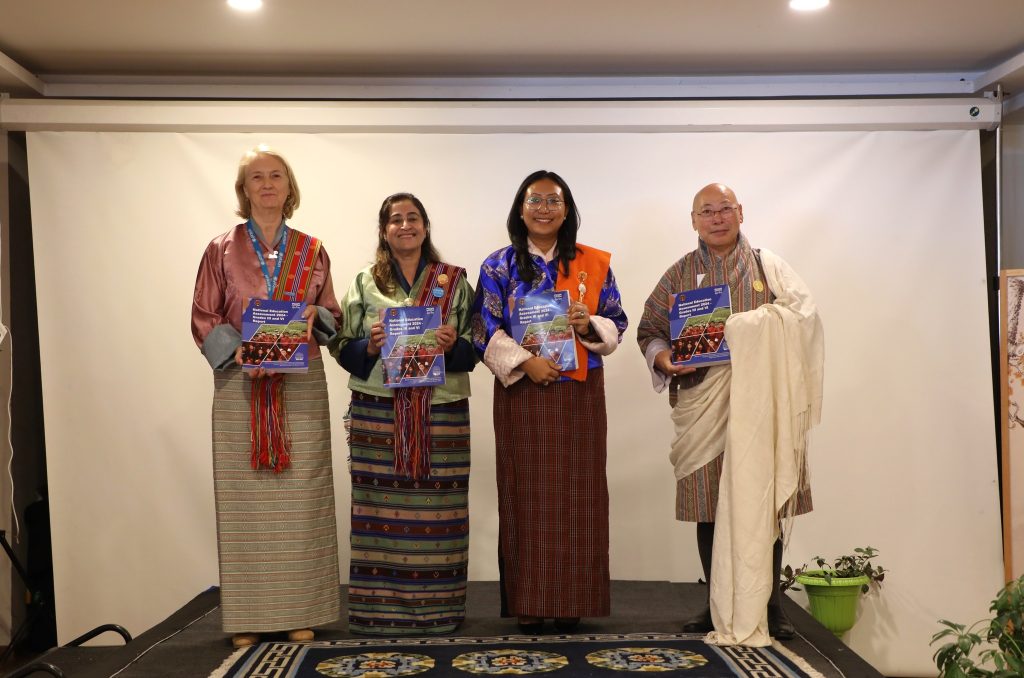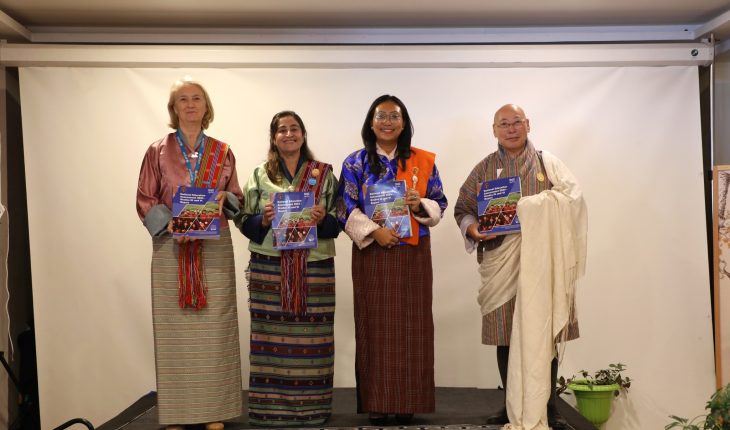
Nearly half of grade III and VI students reported spending at least one hour a day playing digital games
TIL BDR GHALLEY | Thimphu
Bhutan’s National Education Assessment 2024 has exposed deep learning disparities, with students excelling in English and Science but falling behind in Mathematics and Dzongkha, while children with disabilities continue to trail significantly behind their peers.
The Bhutan Council for School Examinations and Assessment (BCSEA), under the Ministry of Education and Skills Development (MoESD), released the National Education Assessment (NEA) 2024 – Grades III and VI Report.
The report, which builds on the first cycle carried out in 2021, highlights both progress and pressing challenges within Bhutan’s education system, particularly in language, mathematics, science, and inclusive learning.
The assessment was conducted in November 2024 across the country. It covered a nationally representative sample of 4,633 Grade III students from 183 schools and 4,810 Grade VI students from 198 schools.
For the first time, the survey also included 107 children with disabilities, marking an important step toward measuring inclusion in education.
Alongside student performance data, information was collected from teachers, principals, and Dzongkhag and Thromde education officers.
Funded by the Global Partnership for Education (GPE) under the System Capacity Grant and supported with technical expertise from Cambridge University Press & Assessment (CUP&A), the NEA is part of Bhutan’s triennial large-scale evaluation of learning outcomes in Grades III, VI, and IX.
Officials said the results will be used as evidence to inform education policy and guide reforms.
Launching the report, Nar B. Raika, Controller of Examinations at BCSEA, said the NEA was critical for strengthening the system.
“The NEA is more than an academic exercise, it is a national diagnostic tool that tells us where we stand and where we must go,” he said.
“It will help us build a stronger, fairer, and more responsive education system.”
At the Grade III level, the assessment recorded a slight improvement in English Reading Literacy, which rose by three percentage points compared to 2021, and Mathematical Literacy, which increased by two points.
However, Dzongkha Reading Literacy proficiency dropped by two points, raising concerns about language balance.
Regional differences were evident: eastern dzongkhags performed above the national average in Dzongkha, while Phuntsholing Thromde outperformed national averages across all subjects.
Performance disparities were also linked to socio-economic status, with students from private and urban schools, as well as children from higher-income families, consistently performing better in English and Mathematics.
Children with disabilities scored significantly lower, particularly in Mathematics, while students with access to Early Childhood Care and Development (ECCD) programs performed slightly better than their peers. Gender differences persisted, with boys showing stronger results in Mathematics and girls excelling in languages.
The Grade VI findings presented a mixed picture. More than 90 percent of students achieved minimum proficiency in English Reading and Writing, and over 80 percent met the benchmark in Dzongkha.
Science proficiency stood at just above 60 percent, but Mathematics remained the weakest domain, with only 36 percent of students reaching the minimum standard.
Thimphu Thromde students consistently performed above the national average in English, Science, and Mathematics, while students in eastern dzongkhags showed higher results in Dzongkha.
Private schools demonstrated stronger performance in English and STEM subjects, though they lagged behind public schools in Dzongkha.
Socio-economic disparities continued to shape outcomes. Students from wealthier households performed better in English and STEM, while Dzongkha proficiency showed no significant advantage.
Dzongkha-speaking students performed strongly in Dzongkha but faced difficulties in English and STEM. Children with disabilities and those without ECCD exposure underperformed across domains. Gender differences were also visible, with girls outperforming boys in language-related subjects and boys leading in Mathematics.
The broader survey findings painted a picture of both
opportunities and challenges in Bhutanese classrooms.
Nearly half of Grade III and VI students reported spending at least one hour a day playing digital games.
School leaders and students pointed to a lack of inclusive facilities and sufficient teaching and learning materials.
Teachers expressed confidence in their instructional practices, but classroom use of ICT remained one of the lowest reported teaching methods.
Education officers highlighted persistent gaps in teacher professional development, especially in ICT integration and 21st-century skills. Despite these issues, teacher job satisfaction levels have remained stable since the 2021 assessment.
International partners and experts who supported the process emphasized the importance of the assessment.
Carmen Hui Jing Lim, Senior Researcher at Cambridge University Press and Assessment, said, “It has been a privilege to support Bhutan in strengthening its assessment capabilities and using data for meaningful educational reform.”
UNICEF Bhutan’s Deputy Representative, Fazia Hoodbhoy, described the report as a reaffirmation of Bhutan’s commitment to ensuring that every child has access to quality education.
“Bhutan is among the few countries globally that undertake National Education Assessments periodically. We are confident that the Government will commit resources to ensure that children’s learning outcomes, equity, and inclusion can be monitored regularly,” she said.
She also underlined the significance of including children with disabilities for the first time in the survey.
“This assessment is not just about data, but about dignity, about recognizing that every child matters, every child deserves to be seen, and every child deserves the support they need to learn and thrive,” she said. “It is not the end of a journey but the beginning of action.”
Education and Skills Development Minister Yeezang De Thapa called the NEA a transformative milestone.
“The National Education Assessment 2024 for Grades III and VI is a transformative milestone in our journey to provide every Bhutanese child with an education rooted in the values of Gross National Happiness,” she said.
“The MoESD remains steadfast in its commitment to ensuring every learner, regardless of background, can access quality education and prepare for a brighter future.”
She stressed the ministry’s focus on inclusive education. “Children with disabilities are as important as any other child, which is why MoESD is giving greater importance to making all schools inclusive,” she said.
According to her, the report will serve four key purposes: informing policy and planning with evidence-based findings, identifying areas for targeted intervention, establishing national benchmarks for tracking progress, and guiding curriculum reforms aligned with broader education goals.
Kinley Dorji, Executive Specialist with BCSEA, reflected on the disparities between urban and rural schools. “Students from urban schools have more exposure to good facilities, while in rural schools, facilities, including internet connection, are not quite good,” he said.
He stressed the need to strengthen pedagogy and 21st-century skills through teacher training, while also investing in infrastructure such as internet and Wi-Fi.
The report identified six broad recommendations for policy and reform.
These include, among others, strengthening Dzongkha literacy in the early grades, improving proficiency in Mathematics and Science at the Grade VI level, expanding access to ECCD, and enhancing support for children with disabilities.
The education minister urged educators, policymakers, and communities to work together in implementing the findings.
“This report informs policy with science-based evidence, identifies needs for intervention, sets national benchmarks, and guides reforms. It is a testament to our collective resolve to empower every child,” she said.
She added that the ministry will continue to work with stakeholders, including BCSEA, GPE, UNICEF, and CUP&A, to sustain progress and align Bhutan’s education system with international standards.





